Nov 15, 2024 – Meeting with Japanese Ambassador to Korea, Offline Dharma Q&A at Jungto Social and Cultural Center
Hello, today is the day when Sunim meets citizens directly for a monthly offline Dharma Q&A session.
After completing his early morning practice and meditation, Sunim spent the morning doing some work. After lunch, he headed to the Jungto Social and Cultural Center.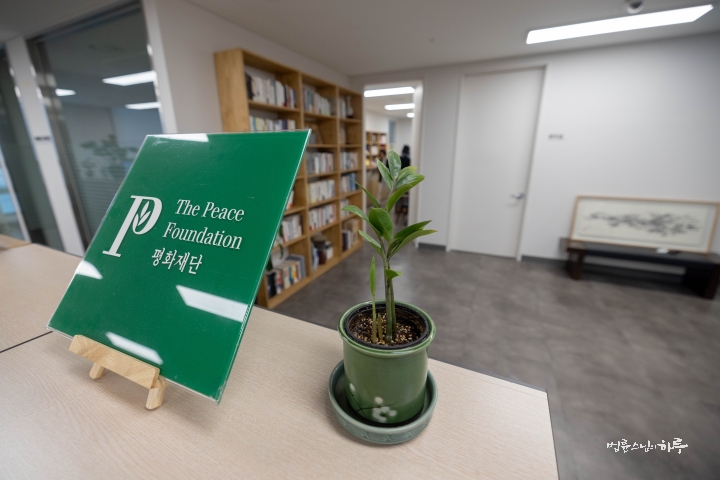
At 2 PM, Mr. Mizushima Koichi, the Japanese Ambassador to Korea, visited Jungto Society.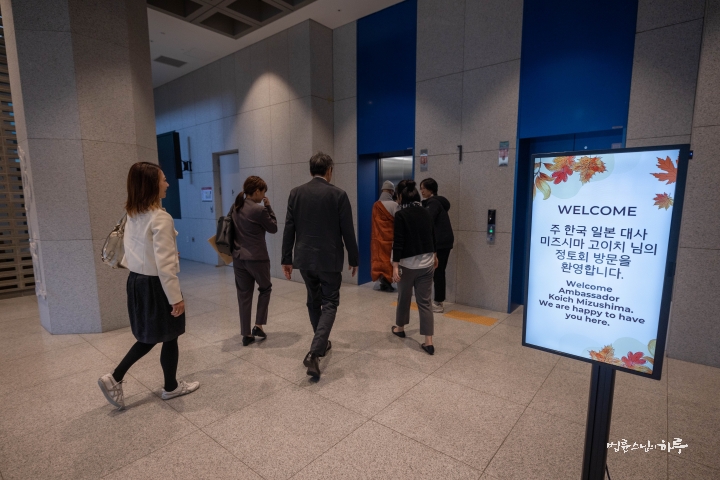
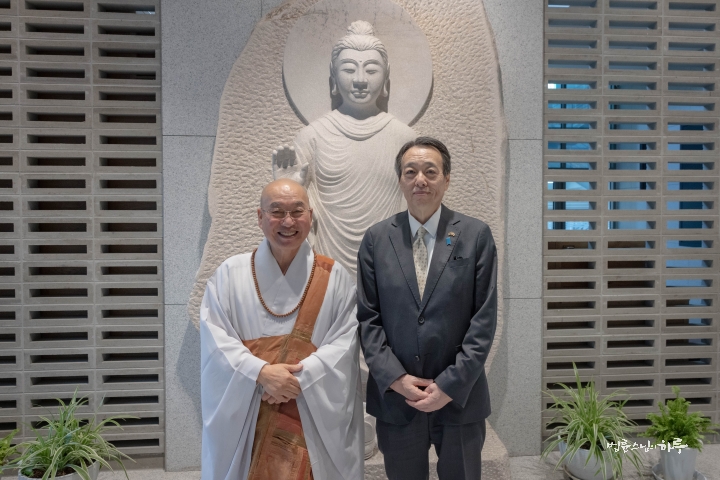
After exchanging warm greetings, they had tea together. The ambassador first explained his reason for visiting Sunim.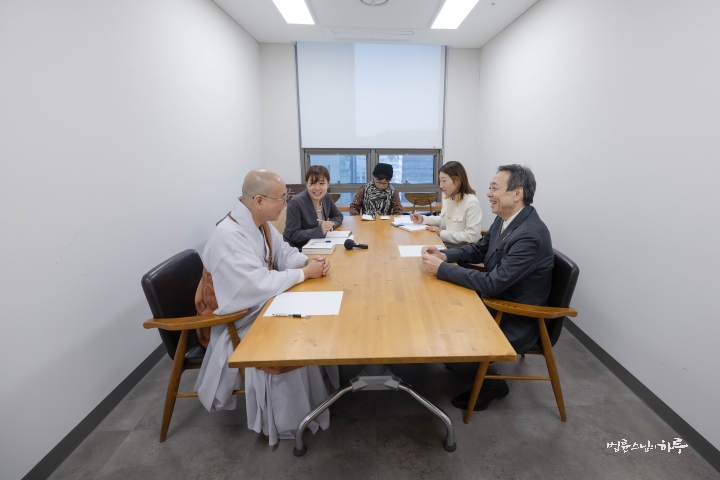
“I met a former Korean Ambassador to Japan in Korea, and he told me that I must meet Venerable Pomnyun Sunim. As an ambassador, I usually meet government officials and journalists of the country, but I was told that Venerable Pomnyun Sunim knows best how Korean people think, so I came to visit.”
“Thank you for coming to visit.”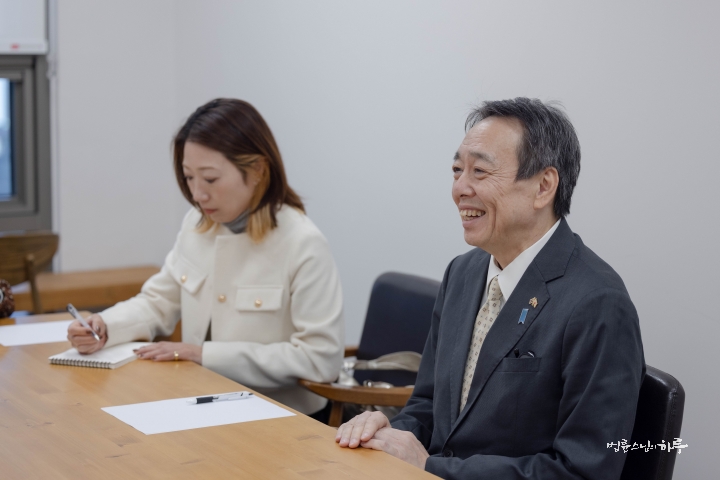
Sunim then introduced Jungto Society and other organizations he established for social practice, including The Peace Foundation, JTS, Good Friends, and Eco Buddha. Naturally, the two discussed at length about improving North Korea-Japan relations and peace on the Korean Peninsula.
“I visited Japan in February and June this year and met with senior politicians to discuss improving North Korea-Japan relations.”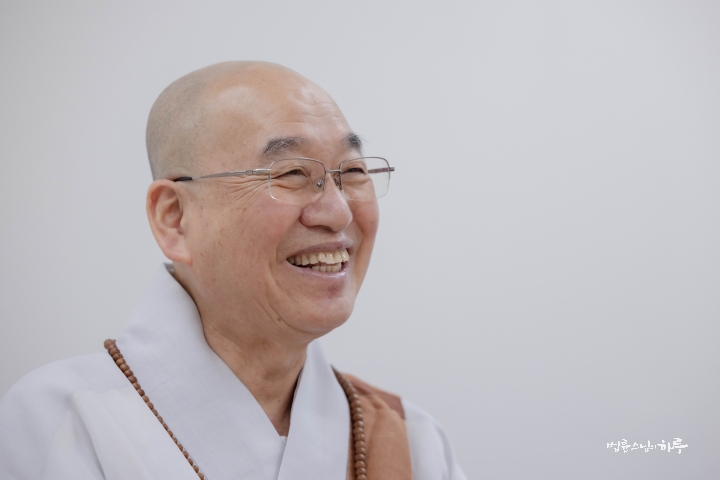
The ambassador explained that North Korea-Japan relations are facing difficulties due to the unresolved issue of North Korea’s abduction of Japanese citizens.
How Can We Improve Relations Between North Korea and Japan?
“The issue of North Korea’s abduction of Japanese citizens is extremely sensitive in Japan. While the media reports 12 people, the police estimate it to be around 800. This year marks the 47th year since the abduction of Megumi, the most symbolic figure among the 12. While Korea is also making efforts to resolve this issue, Japan is putting in a lot of effort as well. I would like to hear your advice on how we can improve North Korea-Japan relations.”
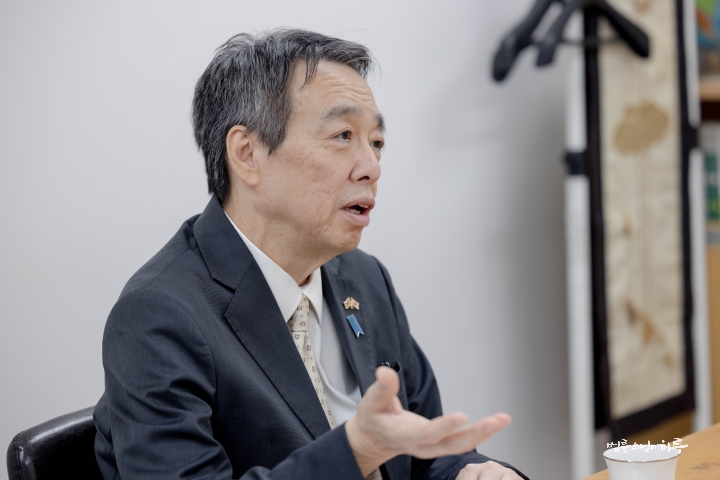
Sunim pointed out that despite being an economic powerhouse, Japan is not playing a corresponding diplomatic role. He urged Japan to take a more active diplomatic role for peace in East Asia.
“From a human rights perspective, or from an individual or family perspective, it’s truly heartbreaking. Such issues should be resolved as quickly as possible, regardless of political considerations. However, there are many things in this world that should be resolved but realistically remain unresolved. Israel’s attack on Gaza is more like a massacre than a war, yet it continues unabated. Because the United States and Europe, which have long advocated for human rights, are neglecting this issue, I believe they are gradually losing their moral legitimacy regarding human rights. Despite the importance of human rights, it seems that resolving these issues becomes very difficult because each country always tries to use them politically from their own perspective. They claim human rights violations when they are victims, but make different arguments when they are perpetrators. So, when I try to resolve such issues from a middle ground, I always face difficulties.
To resolve the issue of North Korea’s abduction of Japanese citizens, we need to understand North Korea’s perspective, which is different from ours. In inter-Korean relations, when there are abductees, South Korea says North Korea kidnapped people, but North Korea claims they defected. Conversely, when North Koreans come to South Korea, North Korea claims South Korea kidnapped North Korean people, while South Korea says they defected. From one side’s perspective, their claim seems correct, but when you listen to both sides, their stories differ. So it’s extremely difficult to say which claim is right or wrong. It’s because their perspectives are different.
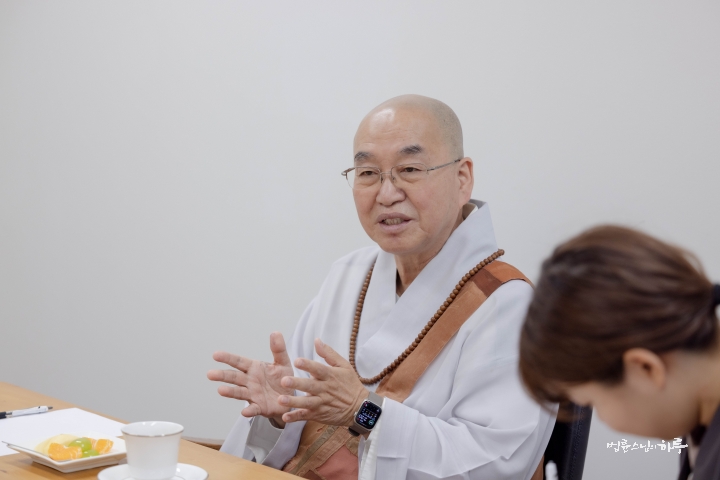
Regarding Japan’s colonial rule over Korea, North Korea views it as a war of resistance against Japanese aggression. While South Korea holds the perspective that compensation should be received for colonial rule, North Korea maintains that reparations should be paid for the war of aggression. Furthermore, since diplomatic relations between North Korea and Japan have not yet been established, North Korea fundamentally considers the state of war to be unresolved. Therefore, while Japan sees it as the abduction of civilians, North Korea views the events of the 1960s and 70s as part of the ongoing war. Consequently, when Japan raises this issue, North Korea counters with, “Didn’t you also abduct and kill Koreans during the Japanese colonial period?” North Korea perceives these as mutual actions occurring within a state of war.
Sunim does not view this from the perspective of whether North Korea’s claims are right or wrong, but rather points out how Japan and North Korea have such different viewpoints on the issue. Therefore, this problem should not be approached from the standpoint of who is right or wrong, but rather from the perspective of “How should we engage in dialogue with North Korea to resolve this abduction issue?”
Similarly, in North Korea-US relations, if the approach is based on the view that “North Korea should not possess nuclear weapons,” dialogue itself becomes impossible. Making denuclearization a precondition is equivalent to refusing to engage in dialogue. Likewise, if Japan insists on prioritizing the resolution of the abduction issue before engaging in dialogue, North Korea will not respond. This results in demands to resolve the Japanese abduction issue being voiced only within Japan, without any actual resolution. Such an approach is merely self-assertion and does not contribute to solving the problem. While it is the North Korean government that suppresses human rights in North Korea, it is also the North Korean government that can improve them. To make substantial improvements in North Korean human rights, dialogue with the North Korean government must first be possible. If dialogue with the North Korean government is impossible, even the most righteous claims will be of no practical help in resolving the situation.
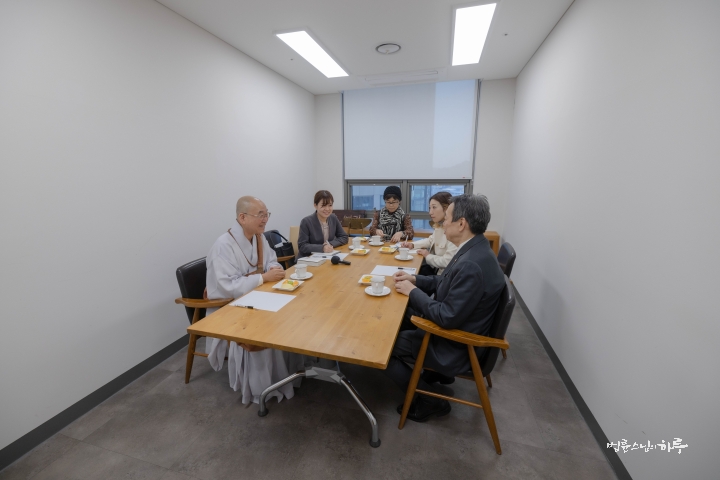
From that perspective, if Japan wants to engage in dialogue with North Korea, it should not put the abduction issue at the forefront. However, from the Japanese government’s standpoint, not emphasizing the abduction issue would face opposition from Japanese citizens, creating a political burden. It’s simply that dialogue isn’t happening because their positions differ, not because the issue is inherently difficult to resolve. Look at President Trump. When he talks with North Korea, he doesn’t make ‘denuclearization’ a precondition for dialogue. Trump says, “If you become friends with someone who has nuclear weapons, doesn’t that reduce the danger?” Similarly, I think Japan should approach this without making the abduction issue a precondition, but rather say, “Let’s have a dialogue to normalize North Korea-Japan relations.” Once dialogue begins, the abduction issue can be addressed privately as much as needed. This approach would make it possible for North Korea to respond to dialogue. The new Prime Minister Ishiba should propose, “Let’s have dialogue based on the Pyongyang Declaration between Koizumi and Kim Jong-il,” without needing to say anything else. That declaration already includes improving North Korea-Japan relations and the abduction issue.
Currently, with both inter-Korean and U.S.-North Korea relations severed, if Japan were to pursue improving relations with North Korea, Japan’s diplomatic position could greatly expand. When both inter-Korean and U.S.-North Korea relations are good, Japan’s diplomatic position is narrow. So, what I’d like to suggest is, since Trump has been elected and the U.S. will inevitably engage in dialogue with North Korea, rather than Japan following the U.S. after it initiates dialogue with North Korea, it would be better for Japan to anticipate the U.S. improving relations with North Korea and start dialogue with North Korea ahead of the U.S. This would make it appear as if Japan broke the ice in dialogue, thus broadening Japan’s diplomatic position in Northeast Asia. I find it somewhat regrettable that Japan isn’t moving in this direction. Although they may have missed the timing with Trump’s election, I think it would be good if Japan, even now, doesn’t just pursue diplomatic stability but plays a greater role for peace in the Northeast Asian region.
Of course, I think Japan could achieve normalization of relations with North Korea faster than the U.S., even if the U.S. initiates dialogue first. In the case of U.S.-China relations, while the U.S. initiated dialogue first, Japan normalized relations with China before the U.S. did. In any case, to resolve the peace issue on the Korean Peninsula, normalization of relations between North Korea and the U.S., and between North Korea and Japan must be achieved. I believe Japan should resolve the abduction issue in the context of normalizing North Korea-Japan relations, and the U.S. should freeze North Korea’s nuclear program in the process of normalizing U.S.-North Korea relations.”
“Thank you. You’ve shared really insightful thoughts based on your rich experience. I will take them to heart.”
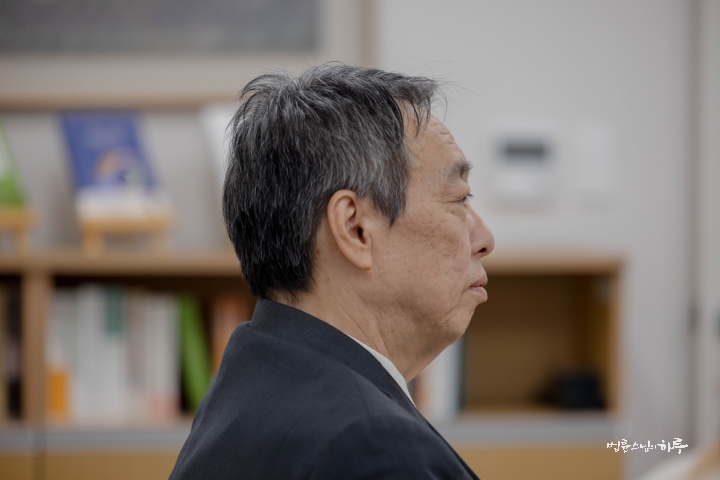
“As the power struggle between the U.S. and China intensifies, Korean diplomacy will have no choice but to align with one side. To maintain even a small degree of autonomy in this situation, the countries Korea should cooperate with most are North Korea and Japan. Similarly, improving relations with North Korea is necessary not only for Japan’s future but also for peace on the Korean Peninsula and in Northeast Asia.”
“I was deeply impressed by what you said, not just for Japan but for the development of East Asia as a whole. Next year marks the 60th anniversary of the normalization of relations between Korea and Japan. Next time, I would like to hear your thoughts on the future of Korea-Japan relations after the 60th anniversary.”
They agreed to discuss more about improving Korea-Japan relations next time and concluded the conversation.
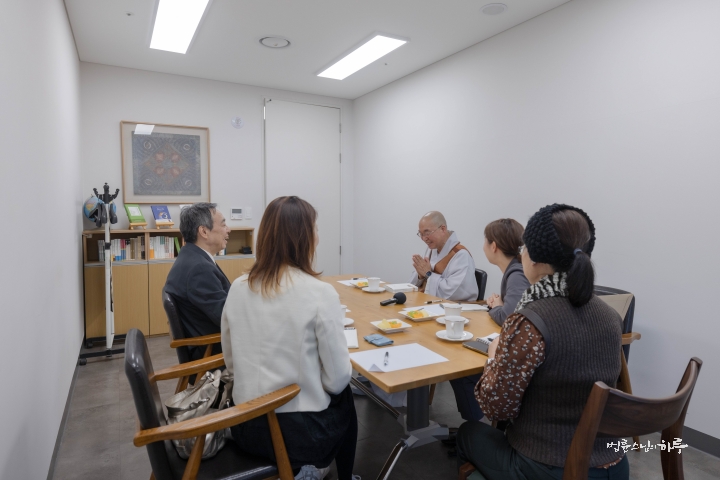
After taking a commemorative photo together, they exchanged gifts. The ambassador presented Sunim with a calendar made of Japanese woodblock prints. Sunim gifted a wind chime embodying the tradition of Korean Buddhism.
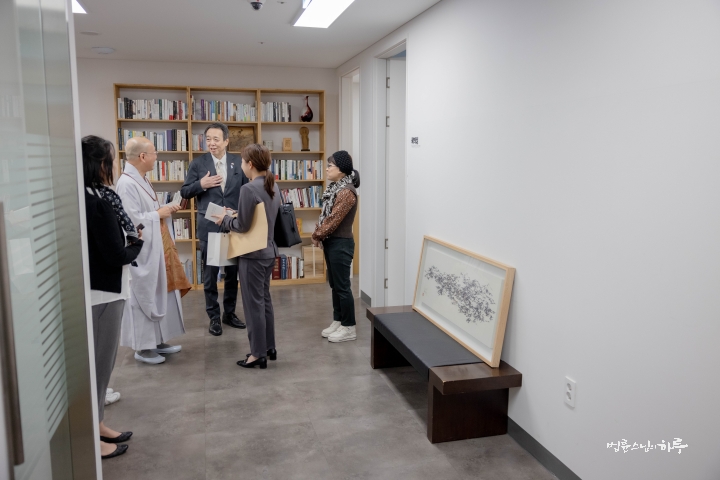
“Next time, I would like to invite you to our embassy.”
“Thank you.”
Sunim accompanied the ambassador to the parking lot and exchanged farewells.
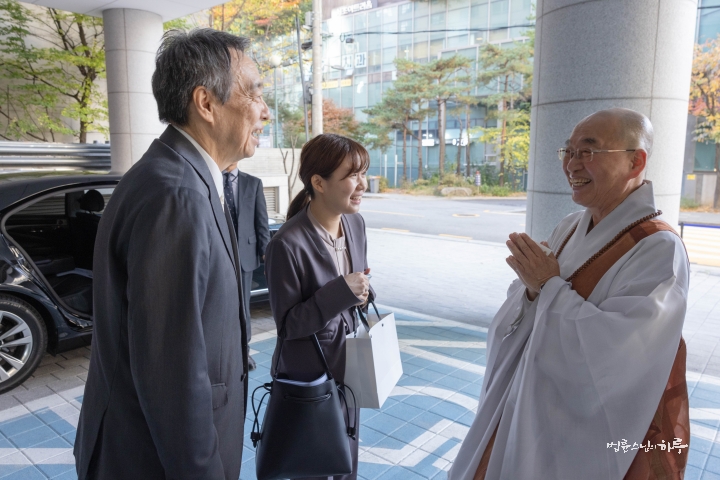
From 4 PM, Sunim had an online meeting with the Jungto Social and Cultural Center Revitalization Task Force team. Last October, the Jungto Society executive board met at the Seonyudong Education and Training Center in Mungyeong and decided to form a task force, which has been having many discussions since then. Finally, the programs are starting to take shape. Today, we discussed in more detail how to organize and proceed with “Venerable Pomnyun’s 100-Day Dharma Talks and 100-Day Special Practice” in the first half of next year, including what programs to run and how to form the preparation team.
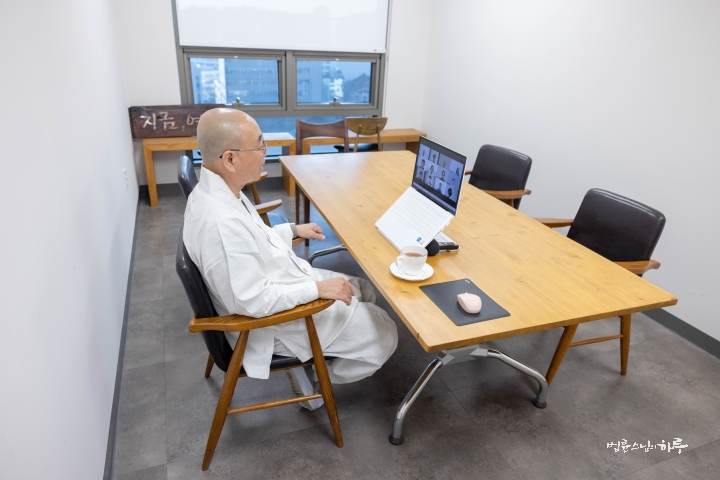
Sunim first shared his ideas, and the task force members expressed various opinions. After two hours of discussion, the meeting concluded at 6 PM.
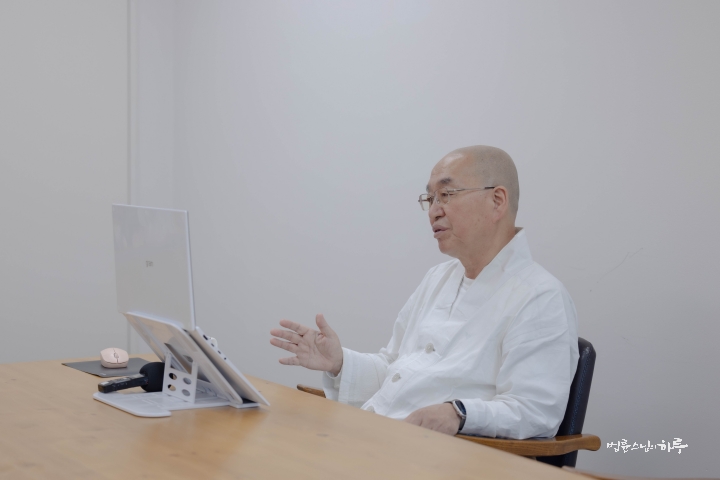
As the sun set, from 7:30 PM, Sunim held an offline Dharma Q&A session in the basement auditorium of the Seoul Jungto Social and Cultural Center.
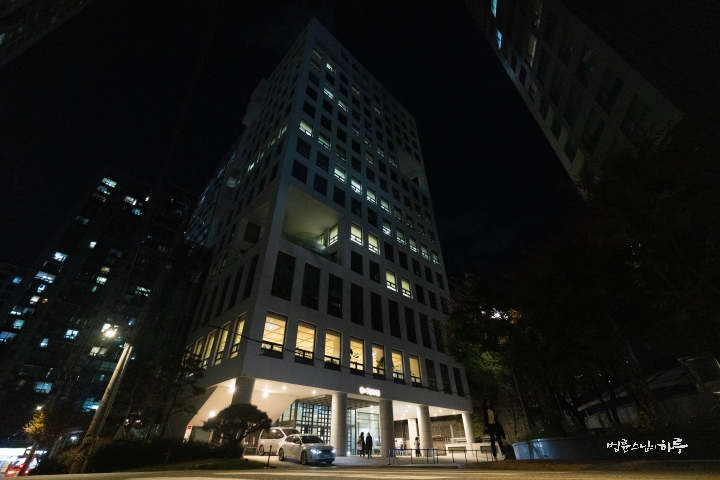
Many citizens came to the Jungto Social and Cultural Center to attend the Dharma Q&A. After registering on-site, they each put a number ticket into a draw box and made their way to the basement auditorium with light steps.
The lecture began with about 5,400 people connected on YouTube and 400 people present at the venue. First, the traditional Korean music group “Geomungo Jari” gave a pro bono performance of two pieces on the geomungo. They had recently performed a creative traditional music concert on the theme of climate crisis and sustainable future, and today they received a big round of applause for their beautiful performance at the Jungto Social and Cultural Center.
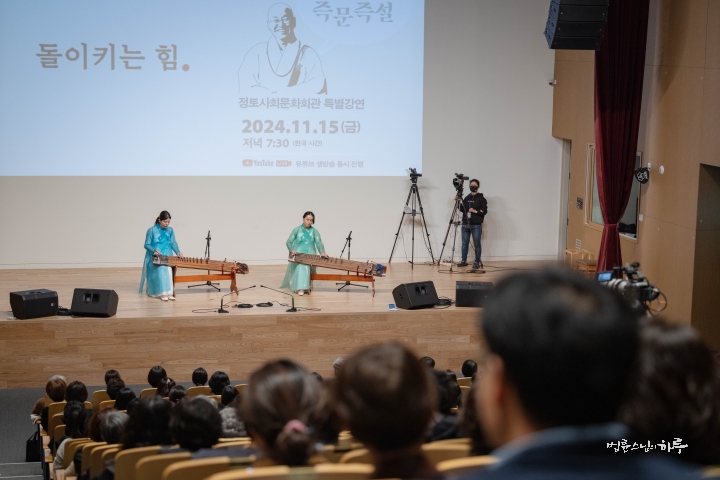
Next, we watched a video of Sunim attending the completion ceremony of a school for 4,000 students in the Turkey-Syria border region, which was severely affected by an earthquake last month. Then Sunim came up on stage.
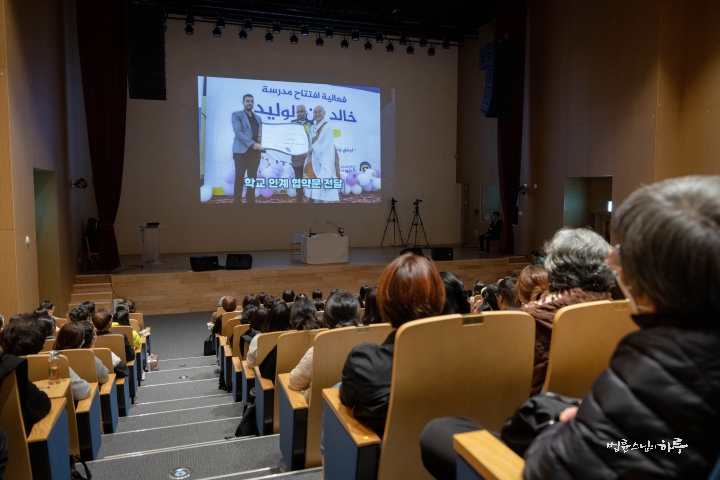
Sunim greeted the audience with a bright smile.
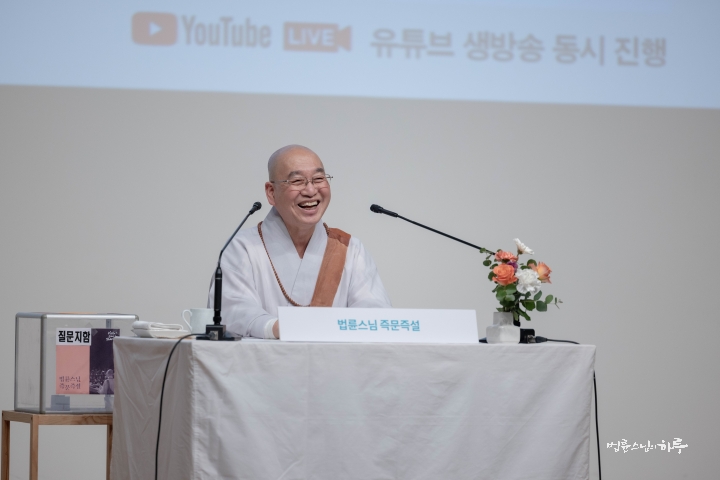
“Did you enjoy the video? The donations we’ve made are being put to very good use. Where there’s no water, we become water; where there are no houses, we become houses; where there are no schools, we become schools. In the past, when we were struggling, most of our schools and hospitals were built with support from Europe and the United States. Today, we have developed economically no less than Europe and the U.S. back then, and culturally, the Korean Wave is tremendous these days. You may know this from the news, but I feel this change more acutely as I travel around the world. Nowadays, wherever I go in the world, local residents greet me with ‘Annyeonghaseyo’ (Hello) and ‘Gamsahamnida’ (Thank you). When we were young, even if we couldn’t speak English, we used phrases like ‘Good morning’ and ‘Thank you,’ right? This means that most people around the globe now know some Korean. Older people might not know much about Korea, but educated middle-aged people watch a lot of Korean dramas. The youth seem to listen to a lot of Korean songs. Just as we used to play only pop songs and not our own songs when we picked up a guitar in the past, nowadays you can see children dancing and performing to Korean songs all over the world.
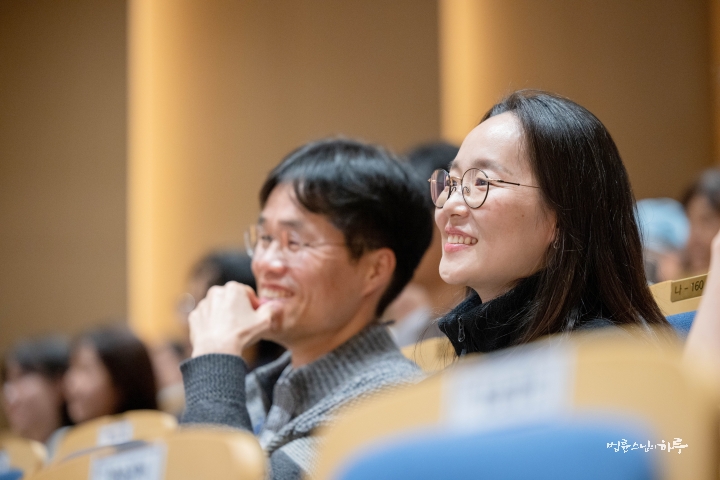
The Spread of Korean Wave and the Accompanying Sense of Responsibility
We built a school in Dungeshwari, a village in India where extremely poor untouchables live, and has been operating it for 31 years now. Even the children living in this remote rural village dance on stage to BTS music during the school’s anniversary celebration. While local teachers guide the traditional dances, the children learn Korean songs and dances by watching YouTube and perform them on stage on their own.
We should not simply enjoy this phenomenon, but also recognize that we have a certain responsibility. Along with humanitarian aid, I believe more support is needed for improving their human rights, especially in education for women and people with disabilities.
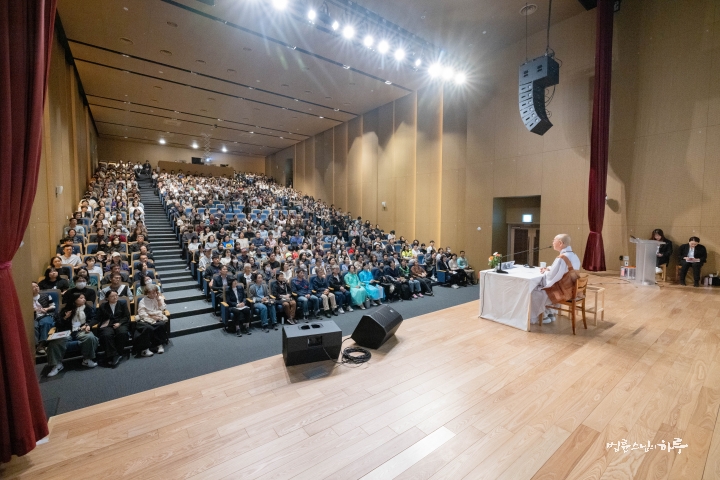
Recently, news reports talk about ‘K-defense industry’ and how well Korean weapons that can cause mass casualties are selling. I don’t find this particularly praiseworthy. If we must make money by producing such weapons, shouldn’t we do it more discreetly? When a country’s leader publicly promotes the good sales of weapons that can kill large numbers of people, it can lower the nation’s dignity. It would be best not to engage in such activities at all, but if it can’t be avoided, wouldn’t it be better to do it quietly? I hope that in the future, people won’t excessively promote or take pride in Korean weapons being good. It’s not particularly good when spectators applaud and cheer as one boxer bloodily beats another in a boxing match. Similarly, it’s not appropriate to stand up and applaud enthusiastically when a movie protagonist indiscriminately kills people. While violent situations may occur in movies, I don’t think we should enjoy them or applaud. Adopting this perspective will help make our world more peaceful.”
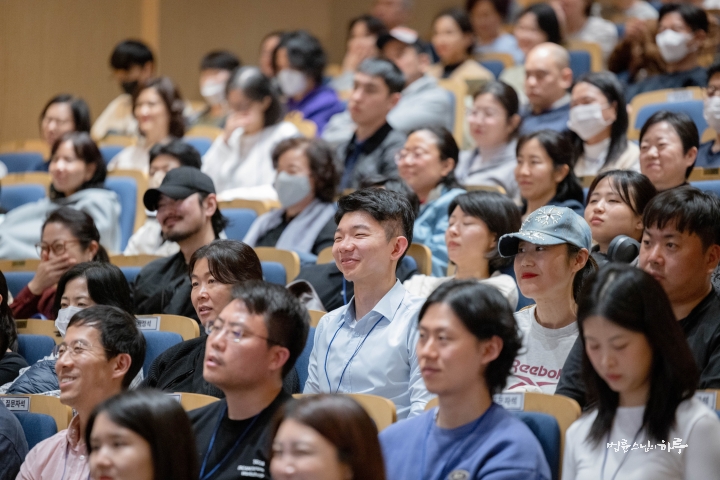
Sunim then listened to the stories of the questioners. Five people raised their hands and engaged in dialogue with Sunim. Additionally, two more people from the audience raised their hands to ask questions. One of them sought Sunim’s advice on how to restore her relationship after discovering her husband had been frequenting entertainment establishments for a long time, expressing her distress.
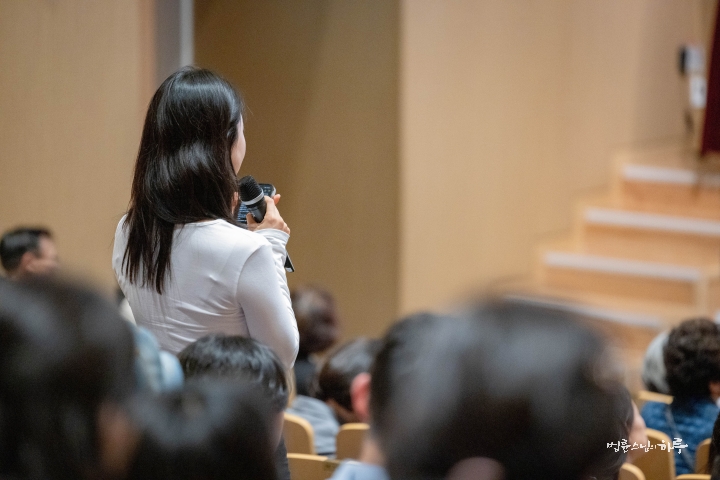
I Found Out My Husband Has Been Going to Entertainment Establishments for a Long Time
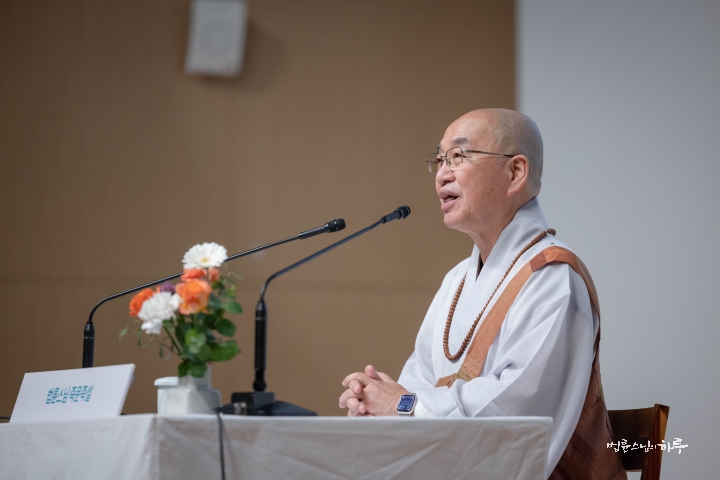
“Get a divorce and come to the temple. As long as you live with your husband, it will be difficult to solve this problem. The reason you’re suffering now isn’t about ethics, morality, or good and evil – whether your husband did well or you didn’t do well. You’re experiencing psychological anxiety. It’s not important whether your husband cheated or not. You’ve developed severe anxiety, always doubting and worrying. If this progresses just a bit further, it could become delusion of infidelity, which is very difficult to treat.
The first thing you need to do is go to a psychiatrist and explain your situation just as you’ve done with me today. You need to receive a medical examination. If your anxiety symptoms are due to childhood trauma, you’ll need trauma therapy. If it’s not trauma but rather an issue of certain substances being over or under-secreted in your body causing nervous anxiety, you’ll need medication. Drug treatment can supplement deficient substances or neutralize excessive ones. Why is such drug treatment necessary for a mental issue? Because all our mental functions are based on our physical body, which is composed of matter. For example, sleeping pills make you sleepy, low blood sugar can make you lose consciousness, and sexual stimulants can cause arousal. In this way, mental functions are influenced by substances, both positively and negatively. Substances can help stabilize mental functions or stimulate them. Even alcohol, for instance, functions to slightly numb the nerves and cause excitement. Someone who’s usually too nervous to speak might find words flowing after drinking a bit of alcohol. This is another example of how substances affect mental functions.
Therefore, you should first get a diagnosis from a doctor and then receive treatment according to that diagnosis. Stabilizing your psychological anxiety should be the priority. The symptoms seem too severe to be resolved simply through counseling. It can’t be fixed just by talking with me and understanding, thinking ‘Oh, I see, that’s how it should be.’ Even if you understand it here, the anxiety will repeat when you go home. You need to go to the hospital and get help first. This is the most important thing.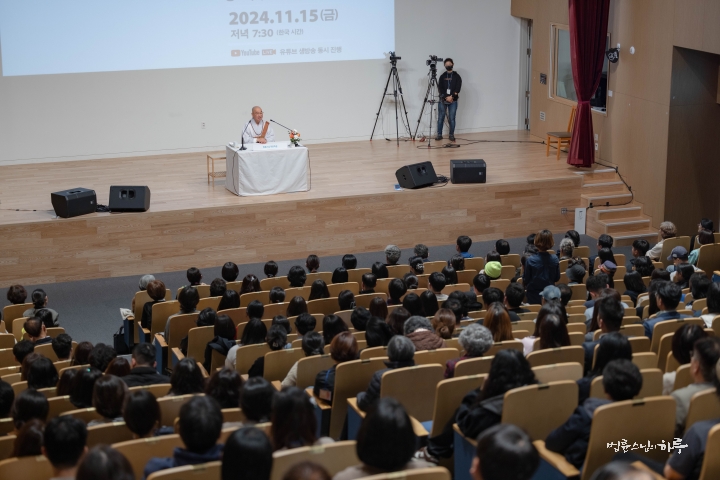
If I am mentally clear and free from any mental health issues, I should make choices based on my own values and life philosophy. Sunim’s decision to remain unmarried and live alone is not a natural ecological phenomenon but a personal choice. Similarly, vegetarianism is not a natural ecological phenomenon but a personal choice. Humans are omnivores, capable of eating both vegetables and meat. Ecologically, we are not carnivores, so eating too much meat can lead to illness. Eating only vegetables can result in nutritional deficiencies. Nevertheless, humans choose vegetarianism for spiritual or ethical reasons, accepting some level of sacrifice. When making any choice, one must be prepared to accept some losses.
From what you’ve said, it seems your husband is a decent person, financially stable, and has a good personality. The issue appears to be your demand for his undivided attention. You’re reluctant to end the marriage because of his other positive qualities, but this particular problem makes it difficult to continue. That’s why you’re seeking my advice. You’re not alone in this; many people face similar dilemmas. They can’t decide one way or the other, which leads to their worries. If your husband were short, overweight, financially unstable, unattractive, ill-tempered, and on top of that, unfaithful, you wouldn’t be here asking for my opinion.
You’re struggling because your husband’s pros and cons are fairly balanced. With such dilemmas, the outcome is often similar regardless of the choice, and regret is common either way. If you choose one option, you’ll miss the other, and vice versa. If you had a clear value system, such as “I cannot live with a husband who drinks and parties with multiple women at entertainment establishments,” you would have already divorced him instead of coming to ask me. Similarly, if you had a clear stance like “I only care about my husband’s financial provision” or “I’m only concerned with my husband’s appearance,” there wouldn’t be a significant issue. You could even adopt an attitude like, “As long as you don’t marry another woman, I won’t question where you go or what you do. Just make sure you earn a good income.”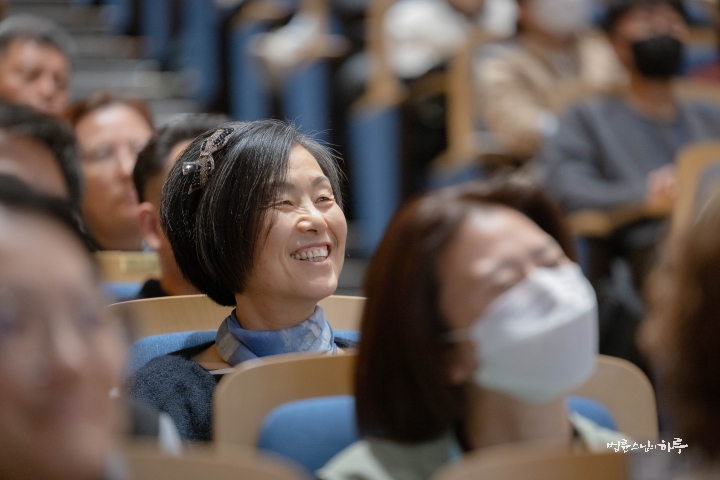
However, due to your anxiety, you may have decided after listening to me that “I can’t live with a man who looks at other women, so I should break up.” But after a night’s sleep, your thoughts might change again. You might think, “How can I live alone?” Then you might go back to your husband and say, “I’ll forgive everything up to now. Don’t do it again in the future.” And if your husband breaks his promise again, you’ll feel like you can’t live with him. This cycle is likely to repeat. Therefore, it’s necessary for you to first visit a hospital and receive a medical examination.
If you decide to continue living with your husband, his going to entertainment establishments and drinking with other women shouldn’t pose a significant threat to your marriage. It would be a major threat if he met someone and started a separate household with them. So, it’s better to overlook this level of behavior from your husband. This doesn’t mean that it’s okay for him to behave this way, nor am I suggesting you tell him it’s acceptable. Verbally, you might say, “If you hang out with other women again, it’s over!” But internally, you should think, “I won’t make an issue of this level of behavior.” This kind of self-determination is necessary. Your husband has already honestly told you that he can’t stop his desire to go out and have fun at bars. So, what’s left for you is to either accept this about your husband and continue living together, or to separate. You need to choose one of these two options.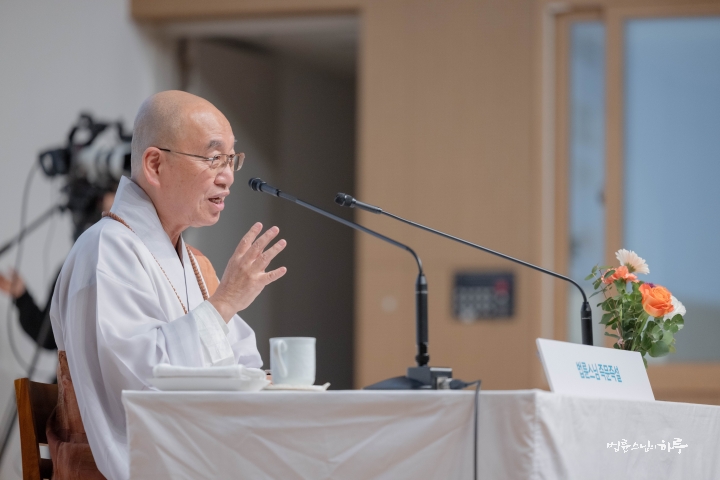
Your husband has been enduring your interference, but now he’s saying, ‘I don’t care anymore. I can’t stop going to bars, and if you can’t live with that, let’s just get divorced.’ He’s pulling out the divorce card. The divorce card shouldn’t be used too often. It should be shown briefly and then put away. If you pull it out completely, the other person might say, ‘Fine, let’s break up,’ and the relationship ends. Your husband is now emotionally exhausted. It’s not that he doesn’t love you, but he’s fed up with your constant calling and suspicion. He’s reached a point where he thinks, ‘I can’t live like this anymore. I’d rather separate than continue living this way.’ One of the reasons for this situation is your anxiety. Do you understand? What will you do now?”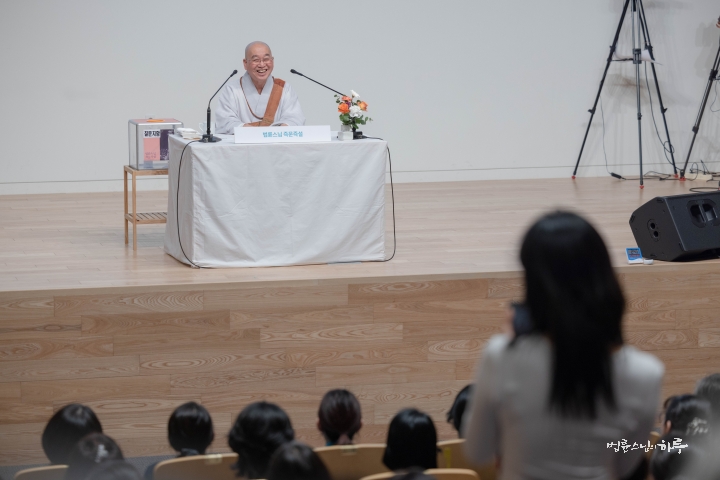
“Yes, first I’ll go to the hospital for a consultation. Secondly, I think I need to reassess my life philosophy and consider what’s most important.”
“Do you have children?”
“No, but my husband wants to have a baby, and I was happily planning for it next year.”
“With your current anxiety and suspicion, it’s not good for you to have a baby. First, it’s not good for the child, and it will make divorce more difficult later. So you need to decide before having a baby. If you don’t treat your anxiety first, there’s a high chance this pattern will repeat even if you meet another man. If you want to stay with your current husband, you need to give up some of your demands. Otherwise, you’ll continue to live in anxiety, making both you and your husband miserable. This would result in a child growing up in an environment where the couple fights daily, which is mentally challenging. In reality, it’s not a big deal. The situation has worsened because of your severe anxiety.”
“Thank you.”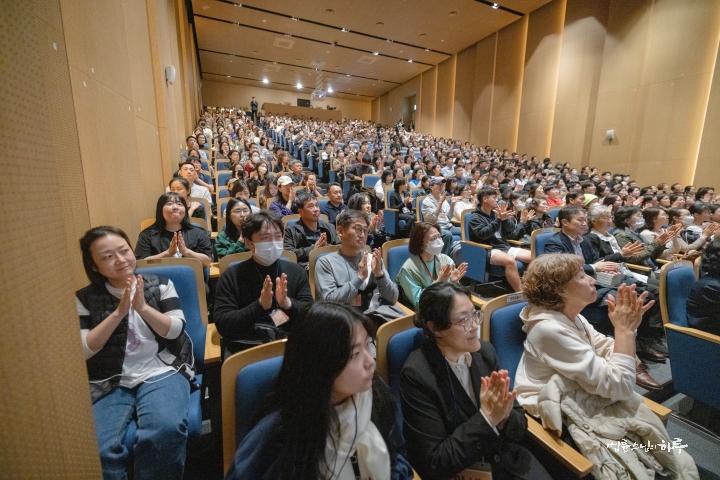
The questions continued.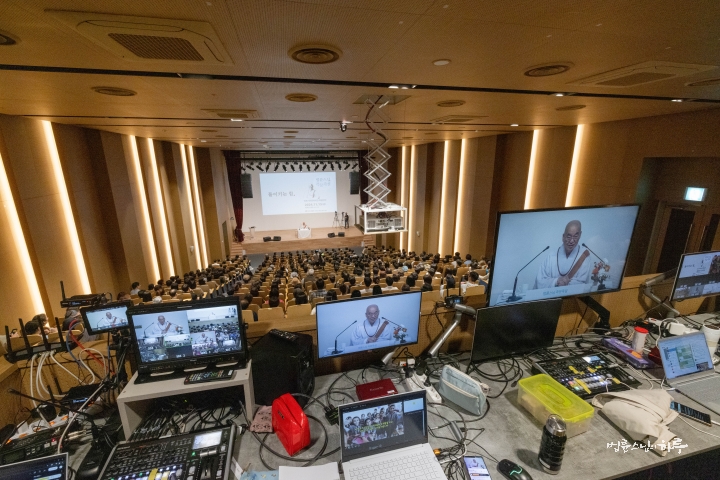
After about two hours of conversation, Sunim gave his closing remarks.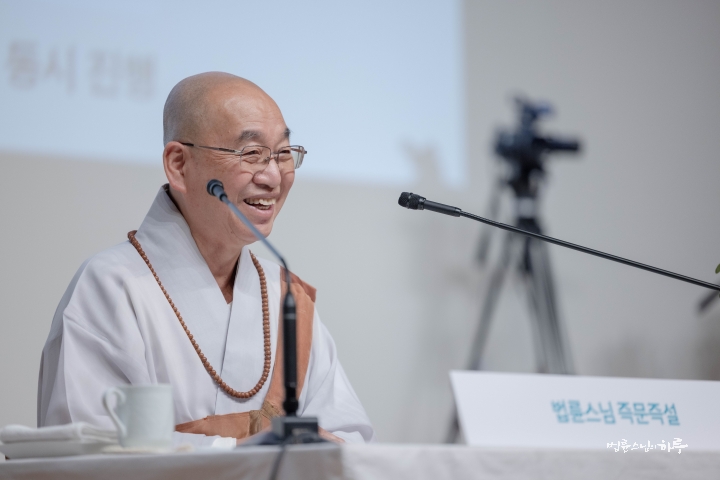
“Everyone has their own good qualities. To any parent, their child is precious. However, we’re accustomed to being ranked by test scores in school. In society, we’re used to being ranked by appearance, like who’s tall or good-looking. You could say we’re living in a modern caste system. If we fall into this ranking mentality, we’ll always feel inadequate no matter how we choose to live.
If it weren’t for your current spouse, you probably wouldn’t have gotten married. You chose your partner after careful consideration, right? If you’re not satisfied after such a careful selection, you should become a monk like me. If not, be content with your current partner. There’s no such thing as 100% satisfaction when living with another person. You might think I seem great now, but if you lived with me for just three days, you’d probably think, ‘My spouse is better.’ I only look good from a distance like this. When you look too closely at anyone, you’ll find problems. Even the most beautiful face won’t look pretty under a microscope. There are bacteria in every pore. So don’t look too closely. You need to live with a broader perspective.
If you scrutinize every detail, like your husband going to bars or company dinners, your marital relationship will become difficult. It’s better to let things go if there are no major issues. Threatening cards should be shown briefly; if you reveal everything, they lose their effect. So you should use that card when you’re actually going to divorce. Say, ‘I can’t live with you like this. Let’s separate.’ That’s when you use it to break up. If you keep making an issue out of every little flaw in your husband, he’ll rebel, saying, ‘Go ahead, do what you want.’ Threats are only effective once or twice. So don’t be too picky in your marriage. Sometimes you need to overlook things to stay together for a long time.”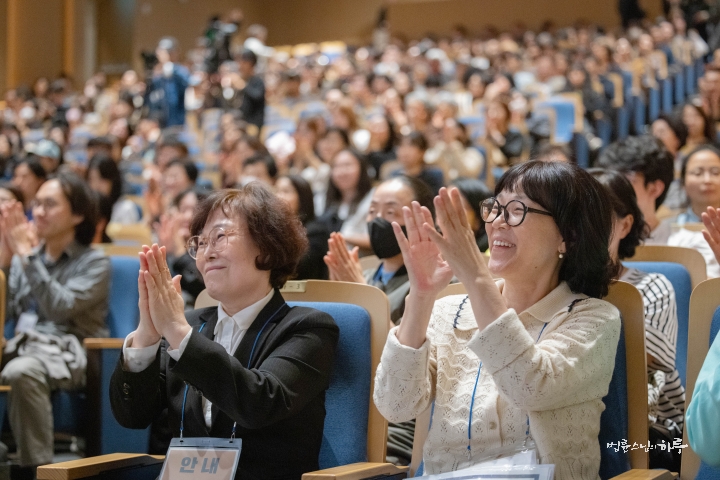
After the lecture, a book signing session was held on stage. Many people lined up in a long queue to receive Sunim’s signature and exchange greetings with him.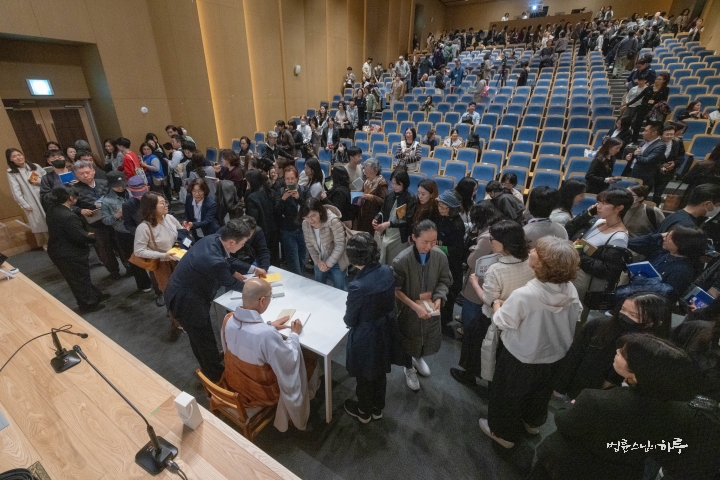
“Sunim, thank you so much. Your lecture has made me truly happy!”
There were many people expressing their gratitude to Sunim.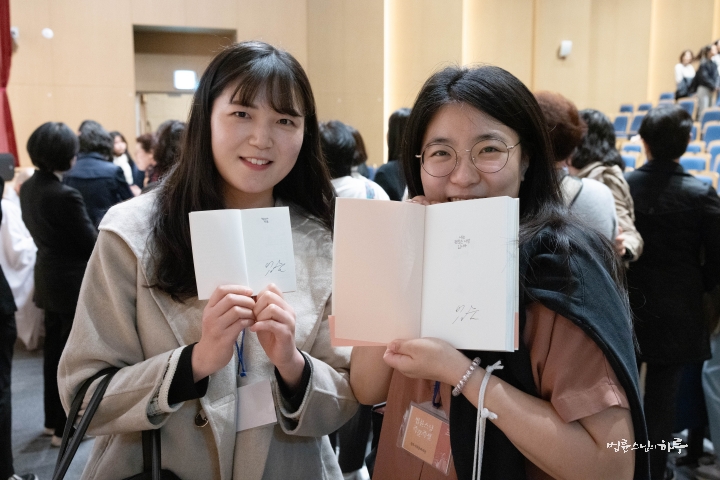
After the book signing, all the volunteers gathered on stage for a commemorative photo. Today, members of the Seoul-Jeju branch of Jungto Society joined forces to prepare for the lecture.
“Seoul-Jeju branch, fighting!”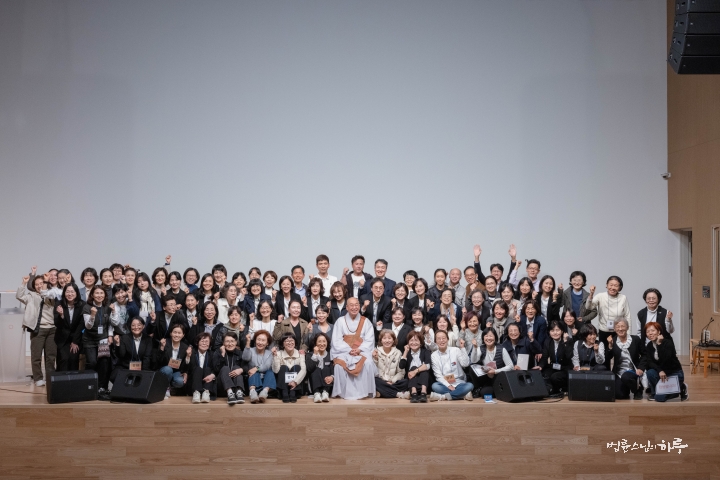
After expressing his gratitude to the hardworking volunteers, Sunim made his way to the Jungto Center.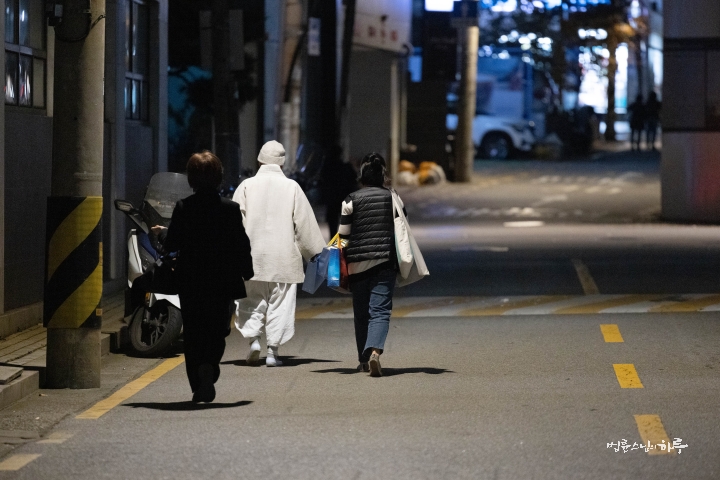
Tomorrow, Sunim will depart from Seoul at 4 AM to travel to the Dubuk Jungto Retreat Center. He plans to spend the entire day with guests who have come from afar to visit the retreat center.




